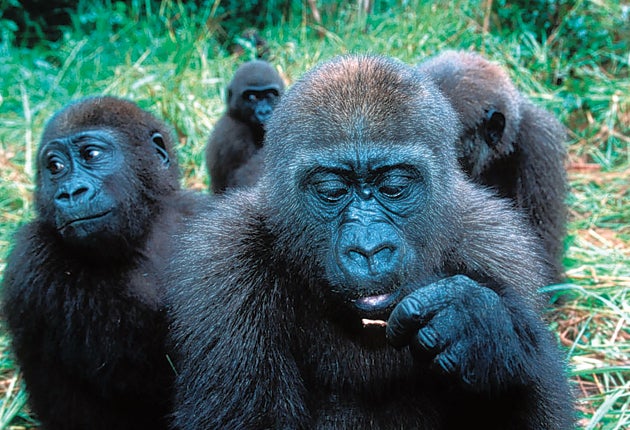Evolution of malaria is traced back to greatest ape
Research may open new avenues of study to halt disease

The malaria parasite, which has killed more people than any other infectious disease in history, almost certainly originated in gorillas infected by a genetically identical microbe, scientists have discovered.
An exhaustive study of nearly 3,000 biological specimens from wild apes living in 57 field sites across central Africa has pinpointed the western lowland gorilla of the Congo as the most likely source of Plasmodium falciparum, the most deadly malaria parasite in humans.
The findings overturn earlier suggestions based on a more limited study that wild chimpanzees were the original reservoir of the human disease, a theory that can now be discounted, the scientists said.
They suggest that the malaria parasite crossed the "species barrier" from gorillas to humans only once as a result of a mosquito bite, causing the global epidemics that have ravaged successive generations of people throughout history.
The researchers believe identifying the original source of the most dangerous form of malaria will lead to greater knowledge of how to combat its spread and how to improve its treatment.
"Understanding where a human pathogen like Plasmodium falciparum originated can be an important step in learning how to prevent and treat the disease that it causes," said Beatrice Hahn of the University of Alabama in Birmingham, US, who led the research team.
"Like Aids, malaria is of primate origin. Studies of the primate precursors of HIV have unravelled many aspects of Aids. I expect the same to happen when the biology of the gorilla precursor of P. falciparum is compared to that of its human counterpart," Dr Hahn said.
Malaria, which is caused by a microscopic blood parasite transmitted by mosquitoes, infects about 500 million people a year, killing about 2 million. It was known by the ancient Chinese, and has been the scourge of western civilisations, from the ancient Egyptians to the British Empire.
Julian Rayner of the Wellcome Trust Sanger Institute in Cambridge, which was part of the research effort, said it was not possible from the findings to determine exactly when the cross-infection from gorillas to humans took place.
"At some time it seems to have jumped the barrier from gorillas into humans but when this happened is difficult to know. One theory is that it was about 12,000 years ago, or even earlier," Dr Rayner said. "Another unanswered question is whether this jumping of the species barrier is still happening. The current data suggests it happened just once, but we don't really know."
The study, which was published in the journal Nature, was based on an analysis of 2,700 samples of ape faeces using a novel technique that could identify and sequence the DNA of P. falciparum parasites in the animals.
The results indicated the western lowland gorilla has carried an ancient parasite that is almost certainly the immediate ancestor of P. falciparum, causing the most deadly form of malaria in humans. The phylogenetic tree the scientists compiled indicated a single leap from gorilla to man, said Martine Peeters of the University of Montpellier, France.
"The notion that P. falciparum could have been transmitted only once from gorillas to humans spawning what we now recognise as a global epidemic is remarkable. However, we cannot exclude the possibility that transmissions between gorillas and humans occur at a local level but have not spread further around the world," Dr Peeters said.
It is unlikely that gorillas infected with the Plasmodium parasite suffer badly from malaria because infection levels are so high, Dr Rayner said. There is another form of malaria infecting apes in Indonesia that can be transmitted to humans by mosquito bites, he said.
Join our commenting forum
Join thought-provoking conversations, follow other Independent readers and see their replies
Comments
Bookmark popover
Removed from bookmarks